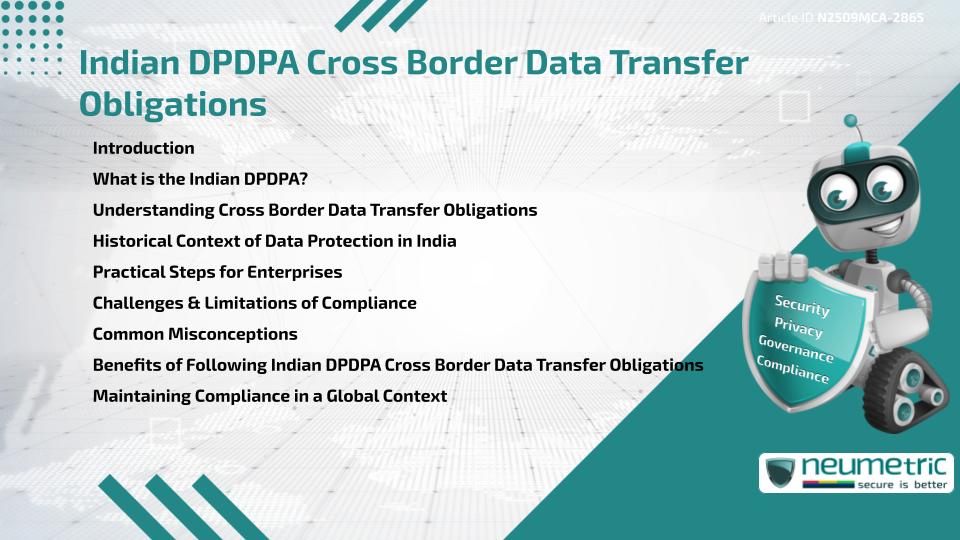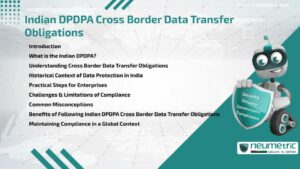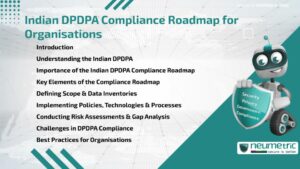Table of Contents
ToggleIntroduction
The Indian DPDPA Cross Border Data Transfer obligations play a central role in how enterprises manage Personal Data outside India. The Digital Personal Data Protection Act [DPDPA] establishes rules to safeguard individual Privacy while allowing businesses to operate globally. These obligations help ensure that when data is sent abroad, it is handled with the same level of care as within India. Understanding their scope, challenges & implications is critical for enterprises aiming to remain compliant while maintaining international operations.
What is the Indian DPDPA?
The Digital Personal Data Protection Act [DPDPA] is India’s comprehensive Framework for managing digital Personal Data. It sets out obligations for enterprises (called Data Fiduciaries) & grants rights to individuals (called Data Principals). Cross Border Transfer of data is one of its crucial aspects, as it ensures Personal Data remains protected even when it moves beyond national boundaries.
Understanding Cross Border Data Transfer Obligations
Under the Indian DPDPA Cross Border Data Transfer rules, enterprises can transfer Personal Data abroad only to countries approved by the Central Government. This ensures that recipient nations have adequate safeguards in place. Enterprises must:
- Verify if the destination country is on the approved list
- Ensure contractual guarantees for Data Protection
- Obtain explicit Consent from Data Principals where required
These steps align India’s Data Governance with global practices while protecting citizens’ rights.
Historical Context of Data Protection in India
Before the DPDPA, India relied on the Information Technology Act of 2000 & its rules to address Privacy concerns. However, these provisions were limited in scope. The landmark Puttaswamy judgment of 2017 by the Supreme Court of India recognised Privacy as a fundamental right, paving the way for a stronger Framework. The DPDPA emerged from these developments to address the Gaps & strengthen Protections, particularly for Cross Border Transfers.
Practical Steps for Enterprises
To comply with Indian DPDPA Cross Border Data Transfer obligations, enterprises should:
- Map all data flows involving Personal Data leaving India.
- Review Contracts with overseas Partners to ensure alignment with DPDPA requirements.
- Maintain Records of all transfers for Audit purposes.
- Implement Data Encryption & Anonymisation where possible.
- Establish Consent Management Frameworks to track permissions.
An analogy here is customs checks: just as goods cannot Cross Borders without checks & approvals, Personal Data too must clear Regulatory safeguards.
Challenges & Limitations of Compliance
Compliance with cross border obligations presents challenges:
- Uncertainty over which countries will be approved by the Government.
- Increased operational costs due to Legal reviews & Technical safeguards.
- Difficulty in harmonising with foreign laws that may conflict with DPDPA.
It is important to remember that while Compliance enhances Data Protection, it does not eliminate all Risks of misuse once data leaves India.
Common Misconceptions
- “All Cross Border Transfers are banned”: Transfers are allowed but subject to Government approval.
- “Consent alone is enough”: While consent is important, Government approval & safeguards are also required.
- “DPDPA applies only to big companies”: The Act applies to all Enterprises that process digital Personal Data, regardless of size.
Benefits of Following Indian DPDPA Cross Border Data Transfer Obligations
Adhering to these obligations offers enterprises several advantages:
- Builds Customer Trust by safeguarding Privacy
- Reduces Legal & Financial Risks
- Enables smoother international Business Operations
- Aligns with global Best Practices in Data Governance
Following these obligations is like following traffic rules abroad-it ensures smoother journeys & avoids penalties.
Maintaining Compliance in a Global Context
Ongoing Compliance requires vigilance. Enterprises should:
- Monitor updates to the approved country list
- Regularly review Contracts with foreign Partners
- Train Employees on Cross Border Compliance Requirements
- Conduct periodic Audits of Data Transfers
By embedding these practices, Enterprises can manage Cross Border Data responsibly while respecting individual rights.
Conclusion
The Indian DPDPA Cross Border Data Transfer obligations balance global business needs with individual Privacy rights. Enterprises must adapt their processes, contracts & technologies to meet these requirements while enabling secure data exchanges.
Takeaways
- The Indian DPDPA Cross Border Data Transfer rules regulate how Personal Data can be sent abroad.
- Government approval of destination countries is critical.
- Enterprises must combine Consent, Contracts & Technical safeguards.
- Misconceptions about complete bans must be corrected.
- Compliance is an ongoing process requiring Monitoring & Audits.
FAQ
What is meant by Indian DPDPA Cross Border Data Transfer?
It refers to the rules governing how Enterprises can move Personal Data from India to other countries under the DPDPA.
Can data be transferred to any country?
No, it can only be sent to countries approved by the Central Government.
Is consent from individuals enough to transfer data abroad?
No, while Consent is necessary, Enterprises must also ensure Government approval & safeguards.
Who does the Indian DPDPA Cross Border Data Transfer apply to?
It applies to all Enterprises processing digital Personal Data that leave Indian borders.
Does the DPDPA apply to Small Businesses?
Yes, all entities handling Personal Data must comply, regardless of size.
How can enterprises prepare for compliance?
They should map data flows, review contracts, implement safeguards & monitor regulatory updates.
Need help for Security, Privacy, Governance & VAPT?
Neumetric provides organisations the necessary help to achieve their Cybersecurity, Compliance, Governance, Privacy, Certifications & Pentesting needs.
Organisations & Businesses, specifically those which provide SaaS & AI Solutions in the Fintech, BFSI & other regulated sectors, usually need a Cybersecurity Partner for meeting & maintaining the ongoing Security & Privacy needs & requirements of their Enterprise Clients & Privacy conscious Customers.
SOC 2, ISO 27001, ISO 42001, NIST, HIPAA, HECVAT, EU GDPR are some of the Frameworks that are served by Fusion – a SaaS, multimodular, multitenant, centralised, automated, Cybersecurity & Compliance Management system.
Neumetric also provides Expert Services for technical security which covers VAPT for Web Applications, APIs, iOS & Android Mobile Apps, Security Testing for AWS & other Cloud Environments & Cloud Infrastructure & other similar scopes.
Reach out to us by Email or filling out the Contact Form…





